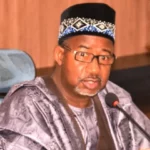To err is human; to forgive, divine’, the phrase, originally from a poem written in 1711 by English poet, Alexander Pope, seeks to explain the fallibility of the human race. While as mortals, we all make mistakes, we should aspire to do as God does and show mercy and forgiveness to others.
The political space in Nigeria is enmeshed in an infectious, political season of seeking forgiveness by none other, than the political actors. The timing of this forgiveness-seeking charade seems suspect, given that it’s coming at the end of their eight years constitutional mandate.
First, it was the septuagenarian Abdullahi Umar Ganduje, the governor of Kano State. He, while at the close of the annual tafsir, to mark the end of Ramadan, in Kano, admonished Muslims on the significance of forgiveness. He asks to be forgiven, as he had forgiven whoever offended him.
Taraba governor, Arc Darius Ishaku, also joined the fray of forgiveness-seeking, final-term executives. In his Easter message, he wants Tarabans, especially those he stepped on their toes to forgive him. He said, “Biblically, we are taught to forgive those who offend us. In this case, I am asking those I have offended to forgive me”. He said he was seeking forgiveness, in the house of God, the church.
The show by Ganduje, expectedly, opened the floodgates of more forgiveness-seeking, final-term political actors. The president, Muhammadu Buhari, also while receiving the Sallah homage in his office, asked to be forgiven, for those he must’ve offended, through some of his hurtful policies.
But can there be a verisimilitude and genuine forgiveness, especially from political actors, or it’s usually a case of mind game, by our politicians exploring the credulity of the average Nigerian?
American author, Nicholas Tavuchis, in his work, Mea Culpa; A Sociology of Apology and Reconciliation, writes that apologies speak to acts that cannot be undone “but that cannot go unnoticed without compromising the current and future relationship of the parties.”
Thus, this general principle: Leaders will publicly apologise if and when they calculate the costs of doing so to be lower than the costs of not doing so. More precisely, leaders will apologise if and when they calculate that staying silent threatens a “current and future relationship” between them and one or more key constituencies—followers, customers, stockholders, or the public.
So many acts or actions, — meaning policies, Executive orders and declarations, bylaws etc- by political leaders, which had an adverse effect on the population, obviously cannot be undone. The damages are great, the pain unbearable. For instance, a retiree or pensioner who died while waiting for his life’s savings, or an individual who consciously lost investment as a result of government policies, would apologies be sufficient enough to gain back lost ground?
While it’s true, some hurting policies are inevitably primed towards achieving a certain national objective, sometimes it comes at a higher cost, to the average citizen. Livelihoods are often destroyed and intergroup relations are hampered in the process.
Take, for instance, the closure of the country’s land borders, a few years back, by the Buhari-led federal government. For whatever intent and purpose it was meant to serve, it turned out to be yet another monumental misstep, whose consequences on the economy are grave, with far-reaching negative impacts on livelihoods.
The argument advanced for the policy was, it would halt the proliferation of small arms in the region, curb cross-border terrorism and smuggling, particularly rice, to bolster local production.
Because, analysis of different data sets show that Nigeria not only lost out in making money from trade within the region, but insecurity also worsened. Data from the National Bureau of Statistics (NBS) shows that Nigeria’s exports to the Economic Community of West African States (ECOWAS) region declined from N2.24 trillion in 2019 to N841 billion in 2020 and N1.24 trillion in 2021.
Similarly, if curbing insecurity was the motivation for the border closure, available data suggest that failed, too. Data from The Nigeria Security Tracker by the Council on Foreign Relations shows there were 8,075 deaths due to violence in 2019, ie (the year the borders were closed), but by 2020, the number of deaths increased to 9,663 and by 2021 the number of deaths jumped to 10,343.
Nigerians are taunted as a people with short memories, religious and tendencies to quickly forget and move on. Which, I think is why our leaders, would oftentimes get away with their anomalies.
With this newfound obsession with forgiveness-seeking, and apology, it will sure be a long list.
The level at which our leaders explore our religiousity, and common faith is appalling. It is one reason, they get away always, even when they brazenly and barefacedly stepped on our toes, with impudence. They know, an apology will suffice.
Insofar as leadership, especially in a democratic culture is hinged on mutual respect and based on the principle of give and take, where the rights of citizens are clearly defined, we must cease to be aloof. We must demand for credible leadership and representation, after all, we all have a stake in the country. Even in authoritarian governments and monarchies, there exists a window for rebellion.
Mohammed is with the Department of Political Science and International Studies, Ahmadu Bello University, Zaria

 Join Daily Trust WhatsApp Community For Quick Access To News and Happenings Around You.
Join Daily Trust WhatsApp Community For Quick Access To News and Happenings Around You.


